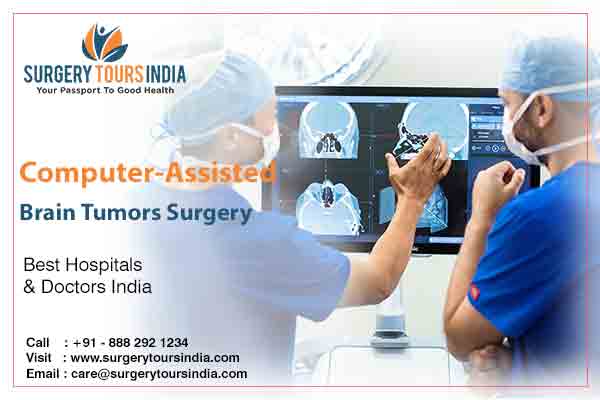
Brain is the main organ of human body as it regulates entire body mechanism and helps an individual to think, act, and function properly. Any abnormality in brain such as a brain tumor can adversely affect its normal functioning and result in severe disability. Brain tumors arise due to accumulation of abnormal cells in an individual's brain and surrounding areas. It can be effectively treated by traditional surgical approach that involves removal of tumor by making detailed incisions. However, if the tumor is inoperable or located at a position which makes it difficult for doctors to remove it smoothly, then computer-assisted brain surgery may prove beneficial.
Computer-assisted brain surgery is an advanced medical intervention which can be used to treat brain tumors. It involves the use of a three dimensional (3D) computerized navigation system along with imaging techniques to precisely remove the brain tumor without damaging healthy cells and tissues in brain.
Patients who belong to the following category are considered to be good candidates for undergoing a computer-assisted brain surgery.
Patients should look out for a qualified and highly experienced neurosurgeon who is well-versed in performing computer-assisted brain surgery. It will significantly raise the chances of successful outcomes following the surgery.
Computer-assisted brain surgery provides a high degree of accuracy as compared to traditional approach. It can be easily performed within three hours with the help of following steps.
Risks and complications associated with this surgical approach are extremely less as compared to traditional brain surgery. The given points elaborate few complications that may arise following the computer-assisted surgery.
Patients need not worry as this procedure is safe and enables the patients to recover at a faster rate.
Patients will require staying in health care center just for a day. In some cases, doctors may request them to stay for a couple of days for a thorough postoperative evaluation. Neurosurgeons may prescribe several medicines to help patients stay active and cope up with uneasiness during initial days of surgery. Complete recovery time will be based on the type of brain tumor and patient's general health. Respective neurosurgeons will provide a suitable diet as well as exercise plan to patients for speeding up recovery. Patients may need to attend occupational therapy and physical therapy to return to their routine life within a short span. It is important for patients to attend follow-up care sessions for minimizing problems and improving their health.
Surgery Tours India Medical Tourism is a highly acknowledged healthcare tourism facilitator across the globe. Medical consultants at Surgery Tours India offer a vast range of advanced and high-quality neurological treatments and surgeries such as computer-assisted brain surgery at reasonable rates. Initially, they help international patients with free online medical consultation and then outline most suitable and cost-effective treatment plans for them. International patients just need to fill a simple form and submit their recent medical reports to serve the purpose. Team Surgery Tours India assists international patients from the moment they arrive in India until their complete treatment and recovery. Also, they stay in contact with overseas patients during the postoperative period in order to evaluate health progress even long after they have gone back to their homeland. Surgery Tours India makes every possible effort to bring a positive change in patient's life. Therefore, international patients who intend to maximize their quality of life by availing best computer-assisted brain surgery in India can count on staunch services provided by Surgery Tours India.
For more information please contact us at
Email: [email protected]
Phone: +91-888 292 1234 / +91-9730 001 540